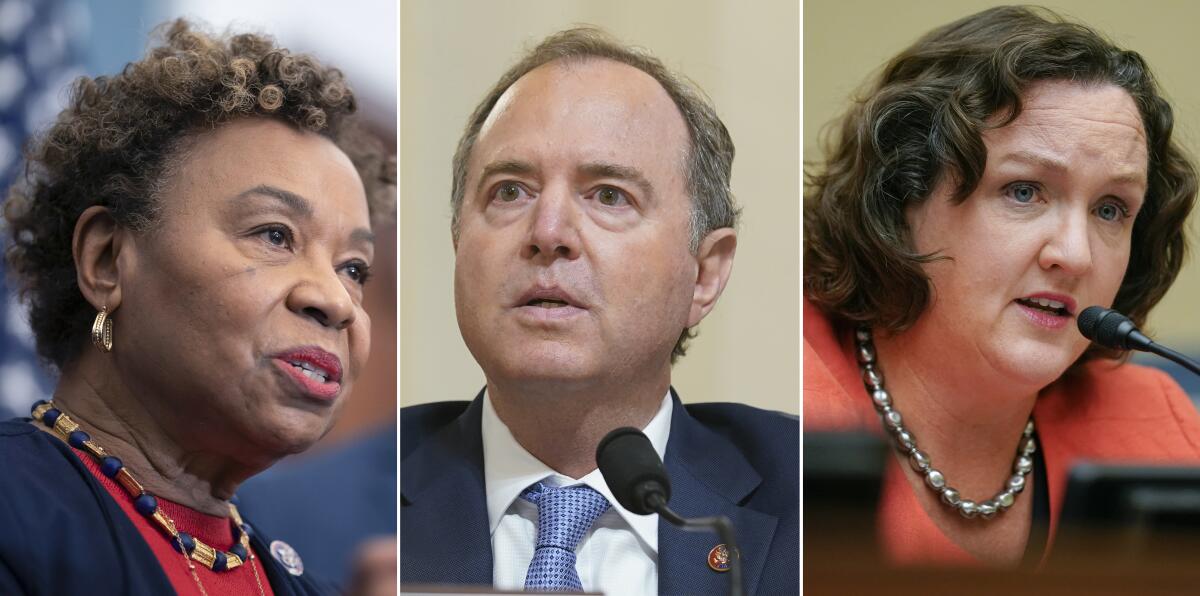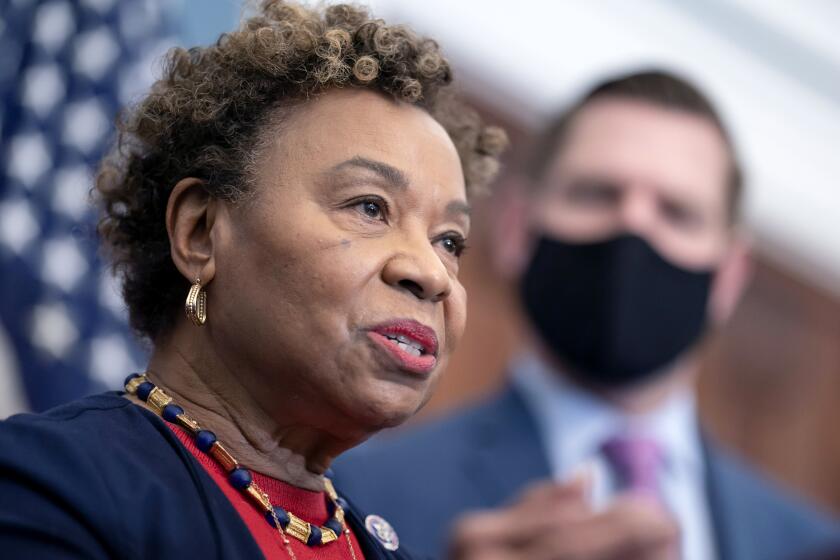Schiff reports major cash advantage over Porter and Lee in Senate race

)
- Share via
In an early test of strength in the race to replace retiring U.S. Sen. Dianne Feinstein, Rep. Adam B. Schiff has a notable financial edge over Reps. Katie Porter and Barbara Lee, according to federal campaign documents released Saturday.
While Schiff was widely expected to have a large war chest because he had a relatively easy reelection campaign last year, he also raised millions of dollars more than Porter, who also is known as a prodigious fundraiser.
Sen. Dianne Feinstein’s weeks-long absence from Washington has refocused attention on Gov. Gavin Newsom’s promise to appoint a Black woman if a U.S. Senate seat opens up.
“Schiff is in a better position than expected. Porter ended up coming shorter than expectations — she’s going to have to demonstrate that she has more fundraising depth than it appears right now. And Lee’s going to have to find another way of doing it other than lots of money, but we knew that from beginning,” said Dan Schnur, a politics professor at UC Berkeley, USC and Pepperdine University. “Schiff has a very strong advantage but it’s not prohibitive. He’s clearly the front-runner, but he shouldn’t be taking anything for granted.”
It’s early — the primary is nearly one year away and the general election isn’t until November 2024.
Schiff, Porter and Lee are the most prominent Democrats among the 18 candidates who have thus far filed to run for the seat. Attorney Eric Early is the best-known Republican, but he entered the race last week, so isn’t required to file fundraising disclosures until July.
While Schiff and Porter both raised millions of dollars in the first three months of the year, Schiff ended the first quarter of 2023 with $24.7 million cash on hand, while Porter had $9.5 million, according to fundraising disclosures posted on the Federal Election Commission’s website Saturday.
The two members of Congress are among the body’s most effective fundraisers, with Porter ranking No. 2 in the last electoral cycle, behind only now-House Majority Leader Kevin McCarthy. Schiff ranked fourth, according to federal election records.
But Porter, a former UC Irvine law professor, had a tight reelection contest in her Orange County district last year and spent heavily to narrowly win reelection. Schiff’s district, which includes Burbank, Glendale and West Hollywood, is heavily Democratic, allowing him to sail to reelection and bank millions of dollars more than Porter. Under federal elections law, both are allowed to transfer funds raised for their House elections to their newly formed Senate campaigns.
Schiff raised $6.5 million and spent $2.8 million in the first three months of 2023, while Porter raised $4.5 million and spent $2.5 million, according to federal elections records.
The gap between the amount they could roll over into their Senate campaigns was widely expected. However, the difference between their fundraising was not, said Thad Kousser, a political science professor at UC San Diego.
“Katie Porter needed to show the ability to catch up,” he said. “She needed to make up ground, and the fact he’s moving further ahead is an important signal.”
Both vastly outraised Lee, who has never needed to raise large sums of money while running for reelection in her heavily Democratic Oakland-based district. Lee raised $1.1 million, spent $101,000 and had $1.2 million cash on hand as of March 31, election records show.
The open question is the influence of super PACs that are not officially affiliated with a candidate and can raise unlimited sums from donors. Each of the Senate candidates is being supported by such a committee; none have filed financial disclosures with the Federal Election Commission yet.
More to Read
Get our L.A. Times Politics newsletter
The latest news, analysis and insights from our politics team.
You may occasionally receive promotional content from the Los Angeles Times.











